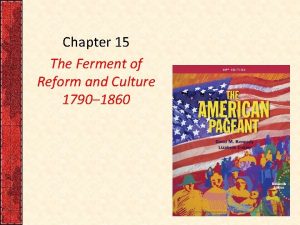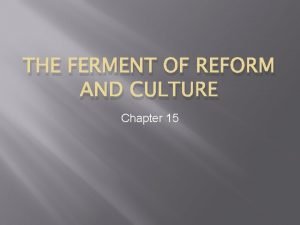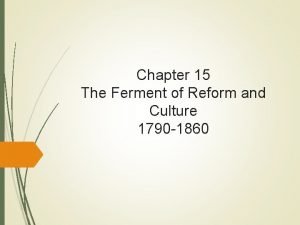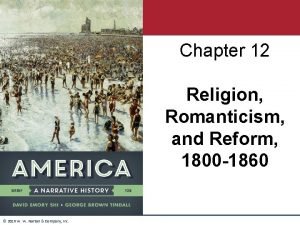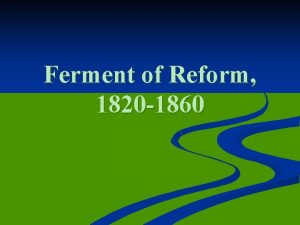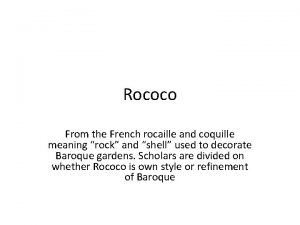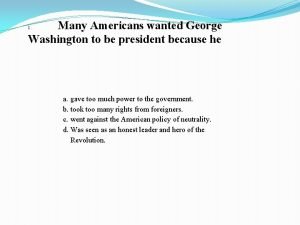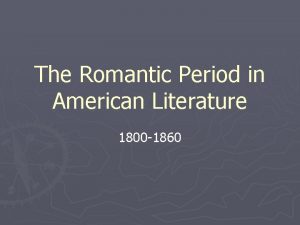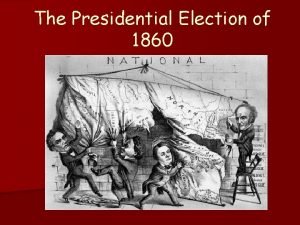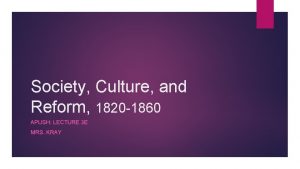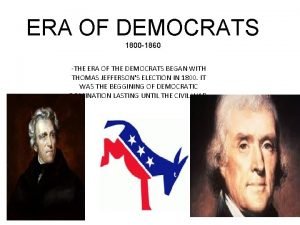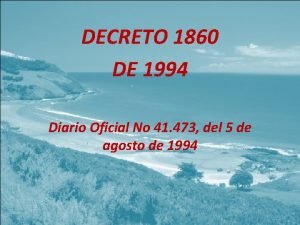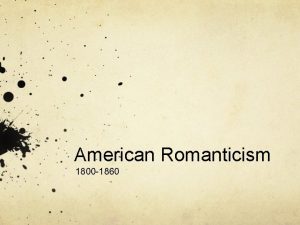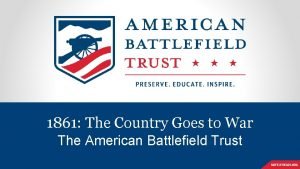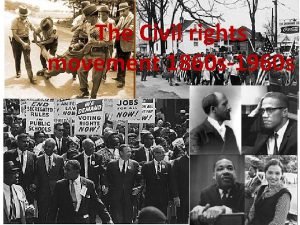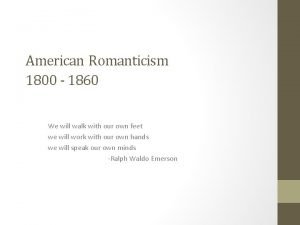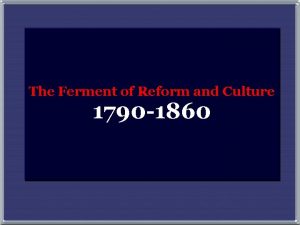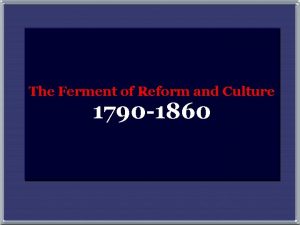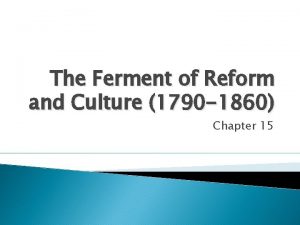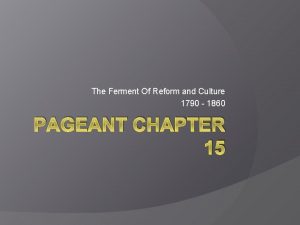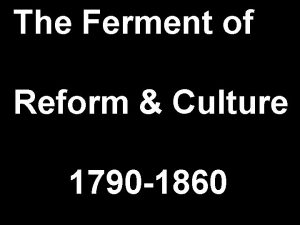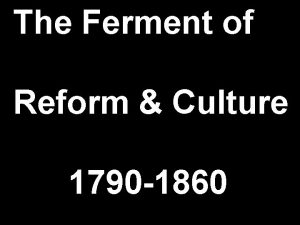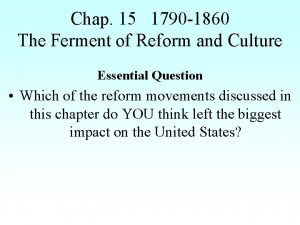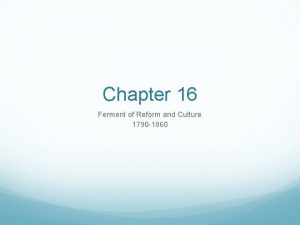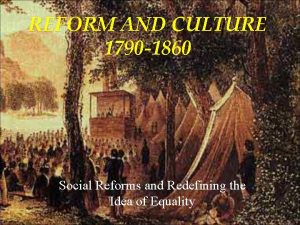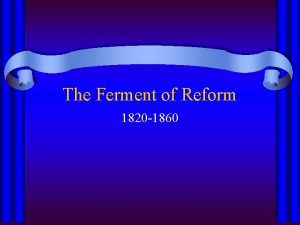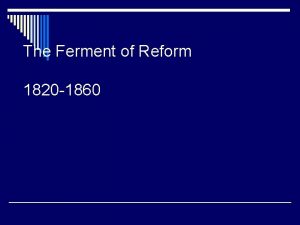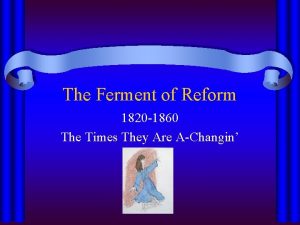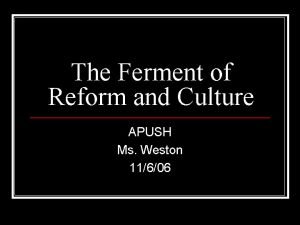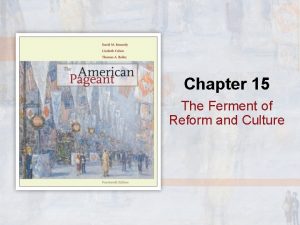The Ferment of Reform and Culture 1790 1860





















- Slides: 21

The Ferment of Reform and Culture (1790 -1860)

Reviving Religion • • • Church attendance was regular in 1850 (3/4 pop) Many relied on Deism (reason rather revelation); rejected original sin, denied Christ’s divinity but believed in supreme being that created universe Puritans of the past now. Unitarian faith (New Eng. ) – God existed in only 1 person not in orthodox trinity; stressed goodness of human nature – belief n free will & salvation through good work; pictured God as loving father – appealed to intellectuals w/ rationalism & optimism

• Liberalism in religion started in 1800 – tidal wave of spiritual fervor that result prison, church reform, temperance cause, women’s movement, abolish slavery – spread to mass through huge “camp meetings” – E went to W to Christianize Indians – Methodists & Baptist stressed personal conversion, demo in church affairs, emotionalism - Peter Cartwright -best known of “circuit riders” - Charles Grandison Finney were greatest of revival preachers - led massive revivals in Rochester & New York Peter Cartwright

Denominational Diversity • • Revival furthered fragmentation of religious faith - New York w/ Puritans preaching “hellfire” known as “Burned-out District” - Millerites (Adventists)-Christ return to earth on Oct 22, 1844 (didn’t come) Widen lines between classes & region - conservatives, propertied- Episcopalian, Presbyterian, Congregationalists, Unitarians less learned of S & EMethodists, Baptists - Religious further split w/ issue on slavery (Methodist, Presbyterians, Baptists split)

A Desert Zion in Utah • Joseph Smith (1830) came up (NY) with Mormon & Church of Jesus Christ of Latter Day Saints antagonism toward Mormons for polygamy, drilling militia, voting as a unit Smith died but succeeded by Brigham Young who led followers to Utah grew quickly by 1850 s by birth & immigration from Euro federal gov. marched to Utah when Young became govnr. But no bloodshed polygamy prevented Utah entrance to US till 1896

Free School for a Free People • • Tax-supported primary school was opposed bec, relate to pauperism & used by poor Gradually supported because “brats” might grow up to be rabbles with voting rights Free public education triumphed in 1825 with vote power in Jackson election - ill taught & ill trained teachers - Horace Mann fought for better school - too expensive for many community; blacks exempt from edu. important people- Noah Webster (dictionary); (Ohioan William H. Mc. Guffey-Mc. Guffey’s readers)

Higher Goals for Higher Learning • • • 2 nd great awakening led to building of small schools in the South and West - mainly on Latin, Greek, Math, moral philosophy (boredom) 1 st state supported university in N. Carolina by Jefferson (dedication freedom from religion and politics) women thought to be bad if too educated Emma Willard-estab Tory Female Seminary (1821) &(Mary Lyon Mount Holyoke Seminary (1837) Libraries, public lectures, magazines flourished

An Age of Reform • • Reformers vs. tobacco, alcohol, profanity, transit of mail on Sabbath, women’s rights, polygamy, medicines Optimistic for a perfect society (women sought reforms) - many were naïve & ignored problems of factory - fought for no imprison for debt (poor lock in jail for less than $1)-gradually abolished - criminal codes soften & reformatories added - mentally insane treated badly (ex. Dorothea Dix fought-classic petition of 1843) - agitation for peace (American Peace Society-1828)-William Ladd (had some impact till Civil & Crimean war)

Demon Rum-The “Old Deluder” • • • Drunkenness was widely spread American Temperance Society formed at Boston (1826)-“Cold Water Army” (children), sign pledges, pamphlets (anti-alcohol tract-10 nights in a Barroom and What I Saw There-T. S. Arthur) Those against Demon Drink adopted 2 major line attack - stressed temperance (individual will to resist) - legislature-removed temptation-Neal S Dow “Father of Prohibition”-sponsored Maine Law of 1851 -prohibited make, sale liquor (follow by others)

Women in Revolt • • • Women stayed home, without voting rights, (19 th century)-better than Europeans Many women avoided marriage all together Gender diff sharply w/ raising eco role - women weak physically & emotionally but fine for teaching - men strong but crude if not guided by women Home center of women (even in reformer Catharine Beecher) but many felt not enough Joined abolishing of slavery, touched by reform

• • • Women’s movement led by Lucretia Mott, Susan B. Anthony (Suzy Bs), Elizabeth Cady Stanton, Elizabeth Blackwell (1 st female medical graduate), Margaret Fuller, Grimke sisters (anti-slavery), Amelia bloomer (semi-short skirts) Women’s Rights Convention (1848)-Seneca Falls-NY - Declaration of Sentimentsspirit of Decla of Inde- “all Men & Women are created equal” - demanded ballot for women - launched modern women’s rights movement Temperately eclipsed by slavery but conditions improved

Wilderness Utopias • • Brook Farm Robert Owen founded New Harmony (1825) confusion Brook Farm-Massa(1841)-20 intellectuals committed to Transcendentalism (lasted till 46) Oneida Community -practiced free love, birth control, eugenic selection of parents to produce superior offspring Shakers -communistic community (led by Mother Ann Lee)-1770 (can’t marry so extinct)

The Dawn of Scientific Achievement • • • Early American interested in practical science than pure - Jefferson & the plow - Nathaniel Bowditch-practical navigation & oceanographer - Matthew Maury-ocean winds, currents Writers concerned basic science Most influential US scientists - Benjamin Silliman(1779 -1864)pioneer in chemist, geologist (taught in Yale) - Louis Agassiz(1807 -1873)served at Harvard, insist on original research - Asa Gray (1810 -1888)Harvard. Columbus of botany - John Audubon(1785 -1851) painted birds John Audubon

• • Medicine in US primitive, bleeding used for cure; smallpox, yellow fever kill many Life expectancy low Self-prescribed patent medicine common (often harmful) Surgery tied people down

• • • Artistic Achievement U. S. imitated European styles 1820 -50 was Greek revival (independence from Turkey) Led later to gothic forms Thomas Jefferson most ablest architect of generation (Montecello & University of Virginia) Artists suffered from Puritan prejudice of art as sinful waste Gilbert Stuart (1755 -1828)-painted Washington & competed with English artists Wilson Peale (1741 -1827) painted 60 portraits of Washington John Trumbull (1756 -1843)-captured Revolutionary War in paint During nationalism upsurge after war of 1812 -US painters portrayed human landscapes & romanticism Music-puritans frowned on non-religious singing “Darky” tunes popular-Stephen Foster“Old Folk at Home” (most famous)

The Blossoming of a National Literature • • Reading plagiarized from England Most literature had a practical outlet (ex. Federalist, Common Sense (Paine), Ben Franklin’s autobiography) Literature revived after War of Independence and especially after war of 1812 Knickerbocker group in NY - Washington Irving (1783 -1859)1 st U. S. international recognition- The Sketch Book) - James Fenimore Cooper(17891851)-1 st US novelistleatherstocking tales(popular in Europe) - William Cullen Bryant(17941878)- Thanatopsis(1 st highly quality poems in US) Washington Irving

Trumpeters of Transcendentalism • • • literature dawn in 2 nd quarter of 19 th century w/ transcendentalist movement (1830) -vs. Locke (knowledge from reason); truth not by observation alone but with inner light -individualism, black or white -Ralph Waldo Emerson (18031882)-popular because ideal reflected US -lectured Phi Beta Kappa Address “The American Scholar” Ralph Waldo Emerson

Henry David Thoreau - Urged US writers throw off Euro tradition Most influential as practical philosopher (stressed selfgovernment, reliance, etc. ) Henry David Thoreau (18171862)-condemned slavery : Wladen: Or life in the Woods On the Duty of Civil Disobedience -further idealistic thought Walt Whitman (1819 -1892)Leaves of Grass (poems) “Poet Laureate of Demo”

• • • Glowing Literary Lights (not associated with transcendentalism) Henry Wadsworth Longfellow(18071882)-wrote poems popular in Euro “Evangeline” John Greenleaf Whittier(1807 -1892)poem cried vs. injustice, intolerance, inhumanity (social influence James Russell Lowell (1819 -1891)political satirist-Biglow Papers Oliver Wendell Holmes (1809 -1894)The last Leaf Women writers - Louisa May Alcott (1832 -1888)(w/ transcendentalism)-Little Women - Emily Dickinson -theme of nature in poems Southern literary figure-William Gillmore Simms (1806 -1870)-“the cooper of the south”(many books-life in frontier, south in rev war) Henry Wadsworth Longfellow

Literary Individualists and Dissenters • Edgar Allan Poe (1809 -1849)-“The Raven” invented modern detective novel fascinated by ghosts-reflect morbid sensibility (more prized by Europeans) • reflection Calvinist obsession on original sin & struggle bet. good & evil Nathaniel Hawthorne (18041864)-The Scarlet Letter (psychological effect on sin) Herman Melvile (1819 -1891)Moby Dick -bet. good & evil told in whale captain

Portrayers of the Past (historians) • • George Bancroft(1800 -1891)found naval academy published US history book -“Father of American History” William H. Prescottpublished the conquest of Mexico, Peru Francis Parkman-pub struggle bet. France & Eng in colonial of N. America Historians All from New Eng bec. had most books (antisouth bias; antipathy-dislike over slavery) George Bancroft
 The ferment of reform and culture
The ferment of reform and culture Chapter 15 the ferment of reform and culture
Chapter 15 the ferment of reform and culture Chapter 15 the ferment of reform and culture
Chapter 15 the ferment of reform and culture The ferment of reform and culture
The ferment of reform and culture Chapter 12 religion romanticism and reform
Chapter 12 religion romanticism and reform American reform movements between 1820 and 1860
American reform movements between 1820 and 1860 Fementation
Fementation 1790 foreign policy
1790 foreign policy Us map 1790
Us map 1790 Rocaille meaning
Rocaille meaning Americans wanted george washington to be president because
Americans wanted george washington to be president because Border states in 1860
Border states in 1860 Evolution de l'aspirateur au cours du temps
Evolution de l'aspirateur au cours du temps The romantic period in american literature
The romantic period in american literature The election of 1860 definition
The election of 1860 definition Arthur and lewis tappan apush
Arthur and lewis tappan apush Whig party beliefs
Whig party beliefs Decreto 1860 de 1994
Decreto 1860 de 1994 American romanticism 1800 to 1860 worksheet answers
American romanticism 1800 to 1860 worksheet answers South carolina 1860
South carolina 1860 1860
1860 American romanticism 1800 to 1860 worksheet answers
American romanticism 1800 to 1860 worksheet answers
